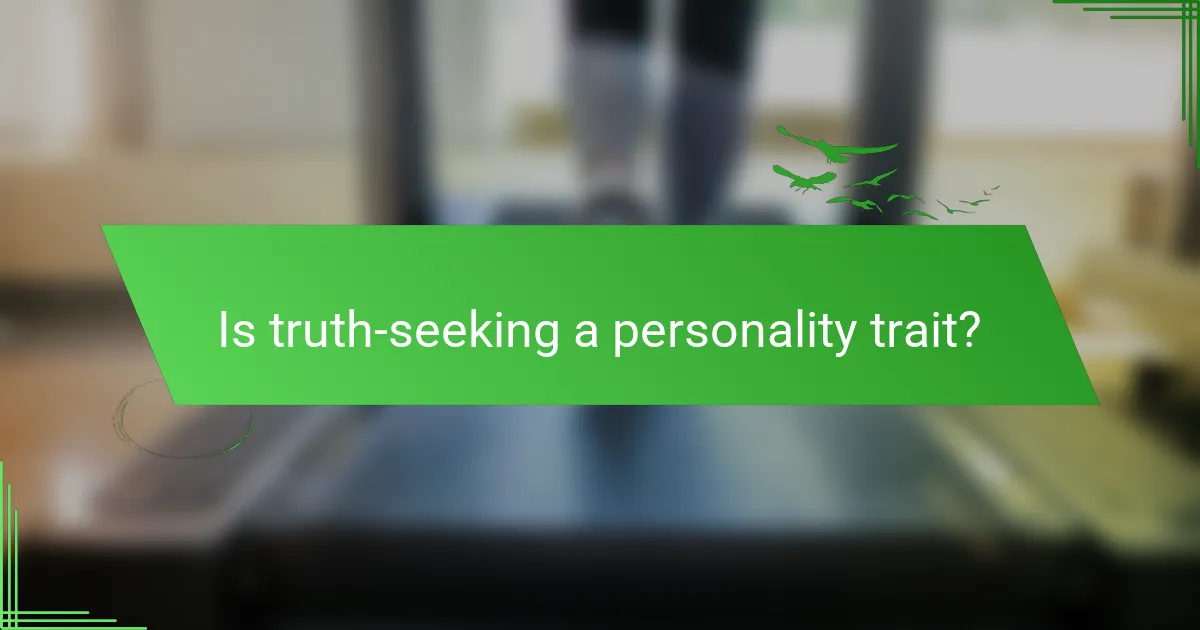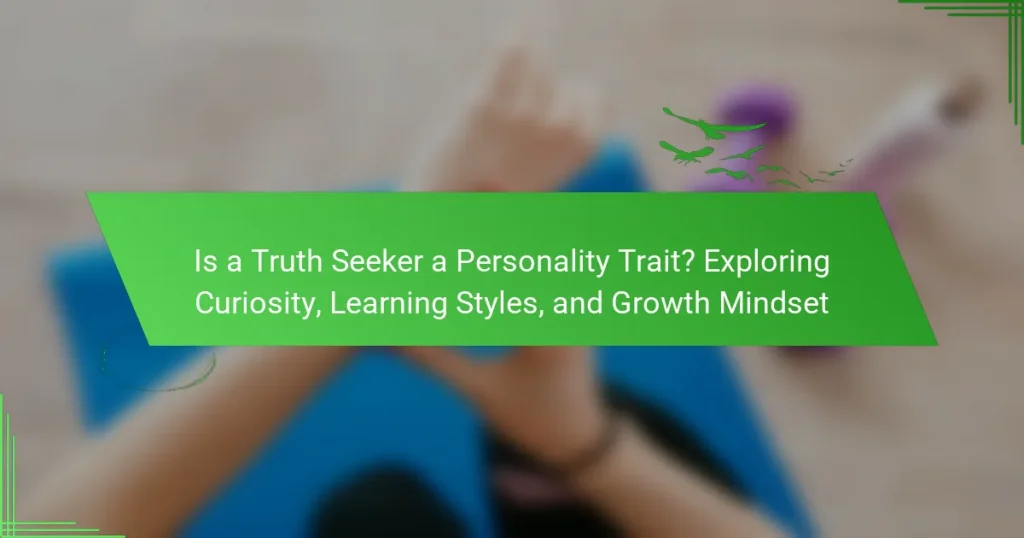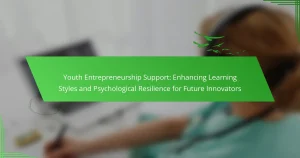Truth-seeking is a personality trait that reflects an intrinsic motivation to explore and learn. This article examines how truth-seeking relates to curiosity, different learning styles, and a growth mindset. It highlights the importance of embracing challenges and viewing failures as opportunities for personal and intellectual growth. Understanding truth-seeking can enhance your approach to knowledge and diverse perspectives.

Is truth-seeking a personality trait?
Yes, truth-seeking can be considered a personality trait. It reflects an individual’s intrinsic motivation to explore, learn, and understand the world. This trait often correlates with curiosity, which drives people to seek knowledge and new experiences. Truth seekers typically exhibit a growth mindset, embracing challenges and viewing failures as opportunities for learning. Research indicates that individuals with high levels of truth-seeking are more open to new ideas and diverse perspectives, enhancing their learning styles. Thus, truth-seeking is a valuable personality trait that promotes continuous personal and intellectual growth.
What defines a truth seeker in educational psychology?
A truth seeker in educational psychology reflects a personality trait characterized by curiosity, diverse learning styles, and a growth mindset. These individuals actively pursue knowledge and understanding, often questioning established norms. Curiosity drives them to explore new ideas, while their learning styles adapt to various educational contexts. A growth mindset enables them to embrace challenges, viewing failures as opportunities for learning. This combination fosters a deeper engagement with the learning process, enhancing both personal and academic growth.
How does curiosity influence learning styles?
Curiosity significantly enhances learning styles by fostering engagement and adaptability. It drives individuals to explore diverse approaches to acquiring knowledge, leading to a deeper understanding and retention of information. For instance, curious learners often adopt a growth mindset, enabling them to embrace challenges and persist in the face of obstacles. This adaptability allows them to switch between visual, auditory, and kinesthetic learning styles based on their interests and the context of the material. As a result, curiosity not only influences how information is processed but also encourages continuous learning and personal development.
What are the different types of curiosity?
Curiosity can be categorized into several types: intrinsic curiosity, extrinsic curiosity, perceptual curiosity, and epistemic curiosity. Intrinsic curiosity drives individuals to seek knowledge for personal satisfaction. Extrinsic curiosity is motivated by external rewards or recognition. Perceptual curiosity arises from novel experiences, while epistemic curiosity focuses on acquiring new information and understanding. Each type influences learning styles and growth mindset differently.
How does curiosity impact academic performance?
Curiosity positively impacts academic performance by enhancing engagement and motivation. Research shows that curious students are more likely to seek out new information, leading to deeper understanding and retention of material. This growth mindset fosters resilience in learning, encouraging students to embrace challenges. Engaging with diverse learning styles can further amplify these benefits, as curiosity drives exploration and adaptation.
What role does a growth mindset play in truth-seeking?
A growth mindset significantly enhances truth-seeking by fostering resilience and adaptability in the pursuit of knowledge. Individuals with a growth mindset view challenges as opportunities to learn, which leads to deeper exploration of ideas and concepts. This mindset encourages curiosity, allowing truth seekers to question assumptions and seek evidence, ultimately enriching their understanding. Moreover, embracing a growth mindset can lead to a unique attribute of persistence, as these individuals are more likely to continue seeking the truth despite setbacks or difficulties.
How can a growth mindset enhance learning experiences?
A growth mindset enhances learning experiences by fostering resilience and adaptability. Individuals with a growth mindset view challenges as opportunities to learn, which increases their engagement and motivation. This mindset encourages curiosity, leading to deeper exploration of subjects and improved retention of knowledge. Research indicates that students with a growth mindset achieve higher academic performance and are more likely to embrace feedback, enhancing their overall learning journey.
What are the universal attributes of truth seekers?
Truth seekers share universal attributes such as curiosity, a desire for knowledge, and an openness to new experiences. These traits facilitate continuous learning and personal growth. Curiosity drives them to ask questions and explore diverse perspectives. Their learning styles often include experiential and reflective approaches, enhancing their understanding. Additionally, a growth mindset enables them to embrace challenges and view failures as opportunities for improvement.
How do truth seekers approach problem-solving?
Truth seekers approach problem-solving with an open mind, relying on curiosity and critical thinking. They prioritize evidence-based reasoning and often seek diverse perspectives. This growth mindset enables them to adapt and learn from challenges. Their unique attribute is the ability to embrace ambiguity and uncertainty, fostering innovative solutions. As a result, truth seekers are more likely to arrive at comprehensive and effective resolutions.
What are the common characteristics of truth seekers?
Truth seekers often exhibit traits such as curiosity, open-mindedness, and a strong desire for knowledge. They tend to embrace a growth mindset, valuing learning and personal development. Additionally, truth seekers are characterized by critical thinking skills, allowing them to analyze information effectively. Their learning styles often include experiential and reflective approaches, enabling deeper understanding and insight.
What unique attributes distinguish truth seekers from others?
Truth seekers are distinguished by their relentless curiosity, open-mindedness, and a strong growth mindset. These unique attributes drive their desire for knowledge and understanding. Curiosity fuels their inquiry, while open-mindedness allows them to consider diverse perspectives. A growth mindset enables them to embrace challenges and learn from failures, setting them apart from others who may resist change or remain complacent.
How do truth seekers engage with new information?
Truth seekers engage with new information by critically analyzing sources and integrating insights into their existing knowledge. They exhibit curiosity, often seeking diverse perspectives to enhance understanding. This growth mindset drives them to adapt and refine their beliefs based on new evidence. Engaging with information also involves questioning assumptions and exploring the implications of findings, fostering continuous learning.
What specific learning styles align with truth-seeking behavior?
Visual, auditory, and kinesthetic learning styles align with truth-seeking behavior. Visual learners thrive on diagrams and charts, enhancing their understanding of concepts. Auditory learners benefit from discussions and lectures, fostering critical thinking. Kinesthetic learners engage through hands-on experiences, promoting exploration and discovery. Each style supports curiosity, driving individuals to seek deeper truths.
What rare traits are associated with truth seekers?
Truth seekers often exhibit rare traits such as open-mindedness, resilience, and a high tolerance for ambiguity. These individuals embrace uncertainty, which allows them to explore complex ideas without immediate resolution. Their insatiable curiosity drives them to seek deeper understanding, often leading to innovative thinking. They value personal growth and are willing to challenge their beliefs, which distinguishes them from others.
How do emotional intelligence and truth-seeking intersect?
Emotional intelligence and truth-seeking intersect by enhancing self-awareness and interpersonal understanding. A truth seeker demonstrates curiosity, which is vital for emotional intelligence. This trait fosters a growth mindset, encouraging continuous learning and adaptability. Truth seekers often engage in reflective practices, promoting deeper emotional connections and authentic communication. Such qualities are essential for navigating complex social dynamics and fostering collaborative environments.
What is the impact of cultural background on truth-seeking?
Cultural background significantly influences truth-seeking behaviors. It shapes individuals’ perspectives, values, and approaches to knowledge. For instance, collectivist cultures may prioritize group consensus over individual inquiry, affecting how truth is perceived and pursued. Additionally, cultural narratives and historical contexts can impact what is considered credible information, guiding the truth-seeking process. Understanding these dynamics can enhance curiosity and promote a growth mindset in diverse learning environments.
How can educators foster truth-seeking behaviors in students?
Educators can foster truth-seeking behaviors in students by promoting curiosity and a growth mindset. Encouraging open-ended questions enhances critical thinking. Integrating diverse learning styles helps engage students effectively. Providing constructive feedback nurtures resilience and exploration. Creating a safe environment allows students to express ideas without fear.
What best practices can enhance truth-seeking in learning environments?
Encouraging truth-seeking in learning environments involves fostering curiosity, embracing diverse learning styles, and promoting a growth mindset. Creating a culture that values questioning enhances engagement and critical thinking.
1. Foster an open dialogue where questioning is encouraged.
2. Integrate various learning styles to appeal to individual preferences.
3. Promote a growth mindset by framing challenges as opportunities for learning.
4. Provide constructive feedback to guide learners in their exploration.
5. Encourage collaboration among learners to share perspectives and insights.
What common mistakes should be avoided in promoting truth-seeking?
To promote truth-seeking effectively, avoid common mistakes such as prioritizing opinion over evidence, neglecting diverse perspectives, and failing to engage in active listening. These errors hinder genuine understanding and growth. Emphasizing curiosity, a growth mindset, and inclusive learning styles fosters a more productive truth-seeking environment.
How can individuals develop a truth-seeking mindset?
Individuals can develop a truth-seeking mindset by cultivating curiosity and embracing a growth mindset. Engaging in continuous learning and questioning assumptions fosters deeper understanding. Practicing critical thinking enhances the ability to analyze information objectively. Setting aside biases and being open to new ideas are essential for growth. Seeking diverse perspectives enriches one’s knowledge base and promotes a more comprehensive worldview.




